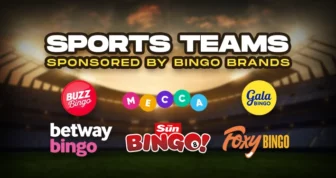
Bingo brands are becoming increasingly visible in the world of sports, forging substantial sponsorship deals with teams and leagues across football, rugby, darts, and even ice hockey. These partnerships have helped online bingo sites reach new audiences while enhancing their brand credibility.
As the industry continues to evolve and diversify, the connection between bingo and sports is growing stronger. Below, we examine the most significant examples of bingo brands sports sponsorships and consider whether more sports teams could be backed by bingo brands in the future.
Mecca Bingo, a household name in the UK’s bingo scene, has made efforts to connect with communities through grassroots sports sponsorships. While not as headline-grabbing as Premier League deals, Mecca has sponsored local football clubs such as Partick Thistle in Scotland. These sponsorships often involve kit branding, local promotions, and joint events that bring bingo players and football fans together. These community-level engagements have shown that even modest, localised sponsorships can deliver substantial ROI, especially when brand loyalty and local goodwill are considered.
Sun Bingo, the digital bingo arm of The Sun newspaper in the UK, has made a substantial mark in the darts world. Known for its vibrant and engaging branding, Sun sponsored several darts tournaments under the Professional Darts Corporation (PDC), gaining visibility through televised matches and arena events. These partnerships significantly boosted brand awareness, especially among sports fans with an appetite for social gaming. The brand’s strategic sponsorship allowed it to tap into a loyal, enthusiastic fan base, thereby increasing both reach and engagement metrics substantially.
Although Betway is widely recognised for its sportsbook, its bingo vertical – Betway – has benefited from the company’s high-profile sponsorship of West Ham United, one of the Premier League’s most iconic football clubs. From 2015 to 2021, Betway was the main sponsor of the team, featuring prominently on the team’s shirts and across the London Stadium. While not explicitly bingo-branded, the overlap between verticals within Betway’s marketing funnel meant that the brand received indirect yet significant exposure. The association with a top-flight football team offered a sense of credibility and mainstream appeal to Betway’s broader gaming offerings.
Buzz, one of the newer but rapidly growing bingo brands in the UK, partnered with the Nottingham Panthers, an elite-level ice hockey team. The partnership began in the early 2020s and included branding on team kits, as well as various in-arena promotions during matches. This was a significantly strategic move, helping Buzz Bingo reach a new demographic that overlaps with its core audience. The ice hockey fanbase is diverse and includes both families and younger fans, making it a smart play for long-term customer acquisition.
Foxy, one of the UK’s most recognisable bingo brands, entered the sports sponsorship arena through a bold partnership with the Rugby Super League. The sponsorship deal, announced in 2011, saw Foxy become the official partner of the competition. This was a notably strategic move, aligning with the working-class demographic that enjoys both rugby league and online bingo. The collaboration included matchday promotions, branded merchandise, and advertising rights, all of which significantly increased the brand’s visibility among a male-dominated audience, traditionally harder for bingo brands to reach.
Gala, another stalwart of the UK bingo industry, has dipped its toes into sports sponsorship with its support of the England Women’s Cricket Team. This was a landmark partnership for both the bingo and sports worlds, marking one of the first major instances where a brand directly sponsored a national women’s sports team. The move substantially helped to enhance Gala’s progressive brand image while aligning itself with a sport on the rise in both participation and viewership. It was a bold yet logical alignment, celebrating female empowerment and community, two themes central to Gala’s branding.
Given the significantly evolving landscape of online gaming and sports sponsorship, it’s highly likely that more sports teams backed by bingo brands will emerge in the coming years. Here are several key reasons why:
As advertising rules around traditional sportsbooks and casinos tighten across multiple jurisdictions, bingo, which is often seen as a softer form of gambling, may become a more acceptable alternative for sports sponsorships. This could open the door to more prominent brand placements on kits, in arenas, and on broadcast feeds.
The rise of women’s football, cricket, and rugby presents a perfect synergy for bingo brands, which often have a strong female customer base. Targeted partnerships in these spaces could substantially boost engagement and brand loyalty, offering a fresh marketing channel that aligns with core audience values.
With online bingo gaining traction in countries like India, Brazil, and parts of Africa, there’s significant potential for bingo brands to sponsor local or national sports teams as a way of establishing early market dominance. These partnerships can serve as culturally resonant entry points that elevate brand perception in the industry.
While bingo brands may not yet have the same level of sports sponsorship clout as traditional sportsbooks or beer brands, their strategic involvement with specific teams and leagues has shown substantial promise. From darts to cricket and football to ice hockey, the alignment between bingo and sports is not only viable but potentially transformative for the industry and its exposure. With the right combination of timing, audience fit, and technological integration, we can expect to see significantly more sports teams proudly displaying bingo branding in the future.